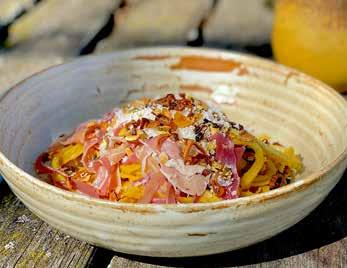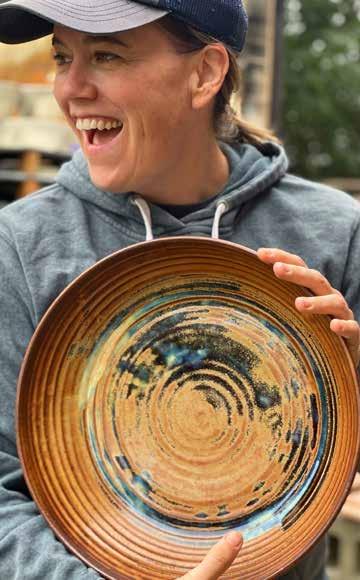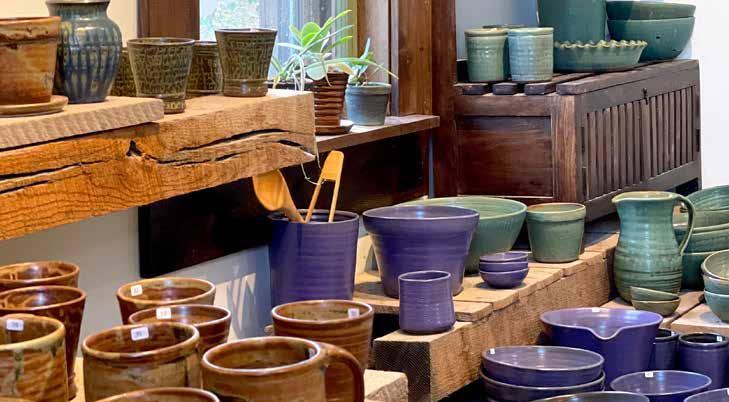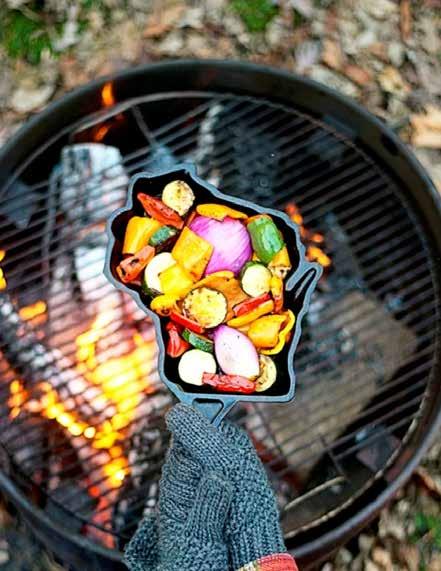
7 minute read
LOCAL MAKERS
LOCAL MAKERS Craftsmanship to Feed the Soul
by Anna Thomas Bates
Advertisement
Local farmers pick tomatoes at peak ripeness, delivering them to markets and restaurants in pristine condition. Chefs use their unique perspective to highlight homegrown vegetables and livestock raised with care. Brewers, cheesemakers and distillers craft distinctive products in small batches using traditional methods. But local food produced with care isn’t the only way a community is nourished. Local artisans and makers put the same thought and care into creating items that feed the soul with their beauty and craftsmanship. Here are four local businesses creating goods that enhance and impact how food is enjoyed every day.
American Skillet Company
____ FeLion Studios
americanskillet.com felionstudios.com
Alisa Toninato of FeLion Studios and American Skillet Company is an artist who expresses herself with 2000-degree molten iron. She studied at Milwaukee Institute of Art and Design, working with metal, sculpture and cookware. After an artist’s residency in Norway, she was inspired to create her first cast-iron skillet in the shape of Wisconsin. This expanded into a desire to create the entire map of the United States out of cast- iron pans, and this launched her career and subsequent two companies. After showing at ArtPrize in Grand Rapids in 2011, Martha Stewart featured Alisa and her cast-iron map on her last show, and FeLion Studios was one of the first companies to be honored with Martha Stewart’s American Made Awards.
This publicity created a demand for Alisa’s skillets and the American Skillet Company was born. The company uses multiple foundries to make a core set of state-shaped skillets manufactured in larger numbers for the public. Each pan is finished and shipped from Alisa’s studio, which was recently relocated to a larger space in Waunakee. Alisa runs the American Skillet Company, but she also stokes her passion with FeLion Studios, a company that creates art, stages community events and creates custom cast-iron pieces for restaurants and more.
Settling into her new, larger space, Alisa wants to expand beyond iron casting to non-ferrous founding classes (using materials like bronze aluminum), offering more classes, artists’ residencies, and she dreams of collaborating with local high schools to teach founding. “It’s engineering and art all in one, and it’s a skill that teaches kids how things are made. Kids need to know this stuff.”
Isaiah Schroeder Knifeworks
schroederknifeworks.com
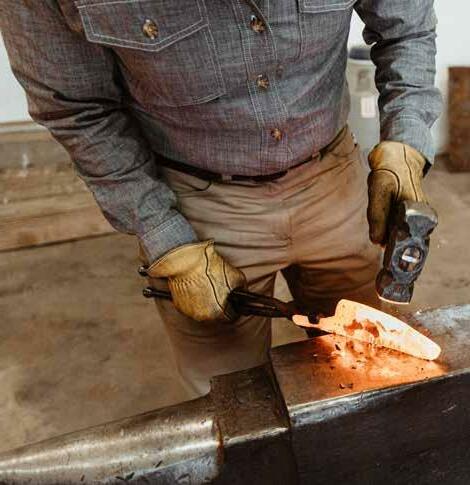
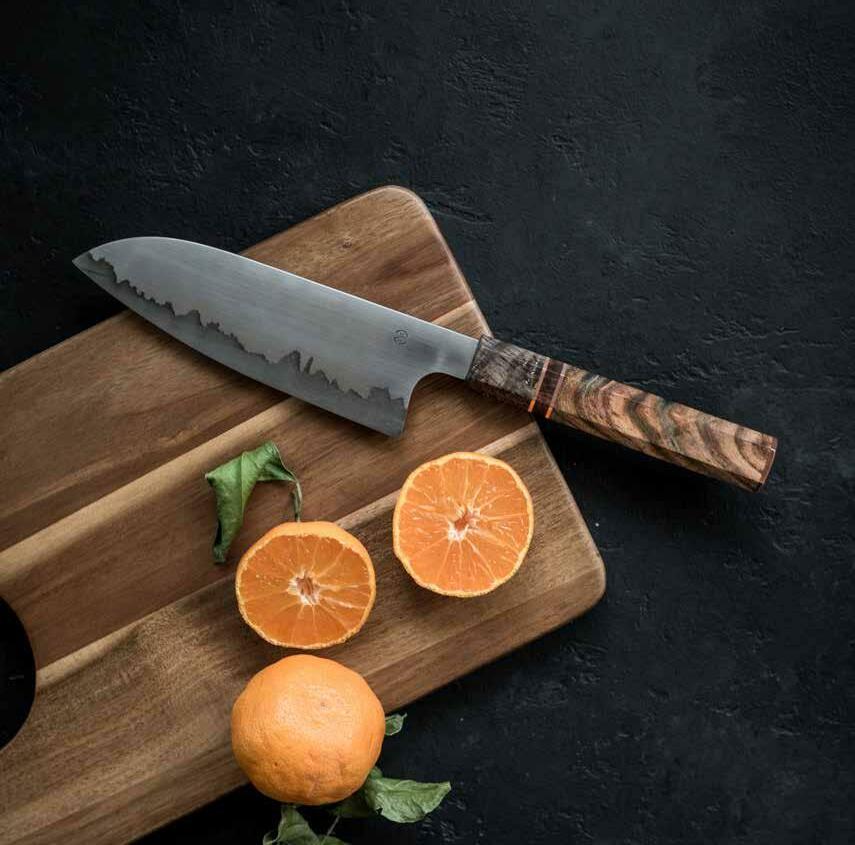
Isaiah Schroeder was always an
artist, making furniture, sculpture and jewelry. While working at Richard Judd Furniture and Zazen Gallery in Paoli, a customer came in looking for custom knife handles. Isaiah was intrigued and began exploring the craft. Through YouTube videos and trial-and-error, he taught himself and sold his first knife in 2015.
People may imagine a knifemaker spends all day forging, but Isaiah says this is “only about one-sixth of the process, but it is the most fun. It’s a free-form art, like making something out of clay. I have a library of templates, but I let the forging dictate how the knife will be. Each one is an individual and unique, even if it is one of my regular offerings.”
He ships knives worldwide, about half to home cooks and half to professionals. He guesses he makes about 150 knives per year. A simple knife takes about 10 hours to make, while a more complicated Damascus style can be closer to 40 hours.
What makes a custom blade different from something you’d find at an upscale kitchen store? “We use higher quality materials, heat-treat the knife to a higher hardness, and spend more time on the grind. We grind it thinner and tweak it so it’s as high-performance as it can be. And we of course focus on aesthetics. A lot of the knives by large brands are made by machine.” Isaiah’s most popular knife is his 180-mm Damascus Gyutu, a small, Japanese-style chef’s knife. This is the one he personally uses most often in his own kitchen. Another regular style in his online shop is a small cheese cleaver with a Wisconsin silhouette cut from the middle (which handily doubles as a bottle opener). His knives sell quickly, but those available for purchase are on his website, schroederknifeworks.com.
He also offers a “Forge a Chef’s Knife” class for four people at a time. Subscribe to his newsletter to see announcements on classes and when knives are available.
Top: each knife is its own functional piece of art. Bottom: Forging a knife. Photo credit: Sunny Frantz (top), Chris Bacarella (bottom)
Driftless Tannery
driftlesstannery.com
Homesteaders Bethany Emond, Danielle Dockery and Brandi Bonde
raise animals, including sheep, goats and alpacas. Bethany was a vegetarian for 25 years. “I needed to start eating meat for health reasons, so I began raising my own animals with respect, care and thoughtfulness. When an animal is commercially butchered, the meat is sold, and the undesirable leftovers are typically tossed. When it comes to the final stage, I don’t want to throw any part of them away. I use the bones, fat, skin—every part I can.” This is her way of honoring the animal that nourishes her family.
They each found a lack of services when it came to treating hides. Bethany tried sending hides to conventional tanneries. But later as she lounged against fluffy sheep fiber on a favorite reading chair, her mouth and nose filled with the smell of harsh metal. Brandi attempted to tan hides herself, using the traditional method of brain-tanning (using the natural chemicals in an animal’s brain to preserve hide) with some success, but there still was a lot to learn.
Through extensive research, and a lot of trial-and-error, they devised a way to tan hides without using harsh chemicals like bactericides, insecticides, bleach and heavy metals. Their business has only been open for one year, and they are already looking for more space, poised to double their business in 2022.
Driftless receives salted hides from farmers who raise animals, then tans them and sends them back. This allows farmers to add value to their farm business. Second, Driftless works with area butchers to take hides out of the waste stream, preserving them to sell directly to customers. These retail hides are available on their website and often sell the same day they are posted. Follow Driftless Tannery on Instagram and Facebook @driftlessnaturaltannery to see when hides are for sale.
Top and bottom: soft and unique hides provide comfort and warmth. Middle: Bethany, Danielle and Brandi, photos courtesy of Driftness Tannery.
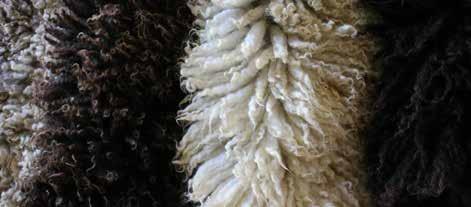
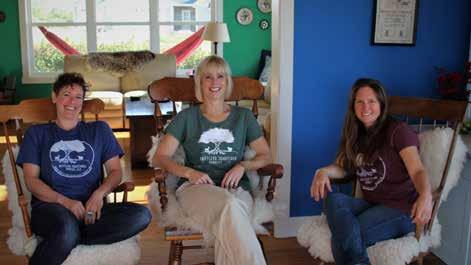
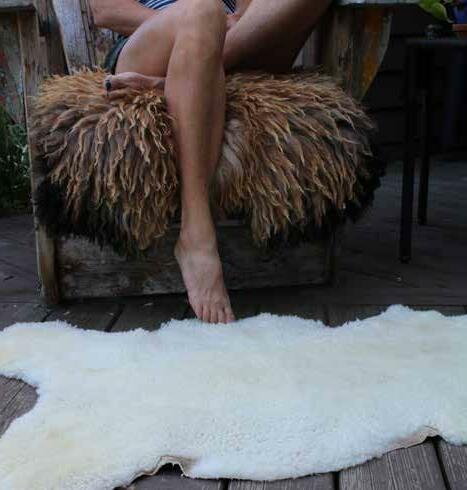

Elderberry Maple ~ Coffee Maple ~ Salted Maple Bourbon Barrel Aged Maple Wilson Creek Pottery
wilsoncreekpottery.com @WilsonCreekPottery
Ashley Pfannenstiel and Shannon Porter met in Chicago while working at an outdoor clothing company. While out to dinner with a friend, they lamented about city living and that Ashley was not pursuing her degree in art. Their friend told them about a woman living in rural Wisconsin who was retiring from her career as a potter and selling her studio. “We had the next few days off from work, so we drove up to Spring Green to check it out, thinking we would just buy a mug. Turns out, we fell in love with the idea and within a few months I had quit my job and we moved up here to start anew,” says Ashley.
In art school, her focus was found object sculpture. “When I bought a pottery studio, I figured I’d better learn pottery quickly. I studied with the potter who was here before me to learn the quirks and challenges of the studio and I relied on my sense of design, sculptural skills and work ethic for the rest.” Wilson Creek Pottery launched in 2012 and crafts a full line of dishware for everyday use, from pie dishes and serving platters to plates, cereal bowls, mugs and tumblers designed specifically for an old-fashioned. The muted glazes span from a pretty wildflower blue, to harvest gold, farmhouse white and patina green.
Ashley loves food and adores living in an area where there are so many farmers and artisans making and growing incredible food. “I want to honor our amazing local, organic produce and food and serve it on an equally considered dish. As we say around here, homemade food deserves handmade dishes.”
Wilson Creek Pottery’s studio is located at E6101 County Road WC in Spring Green and is open daily from 10-6.
Clockwise from top: Ashley’s bowls develop a unique patina, Ashley with one of her signature bowls. The studio always carries a range of products. Photos courtesy of Wilson Creek Pottery.
